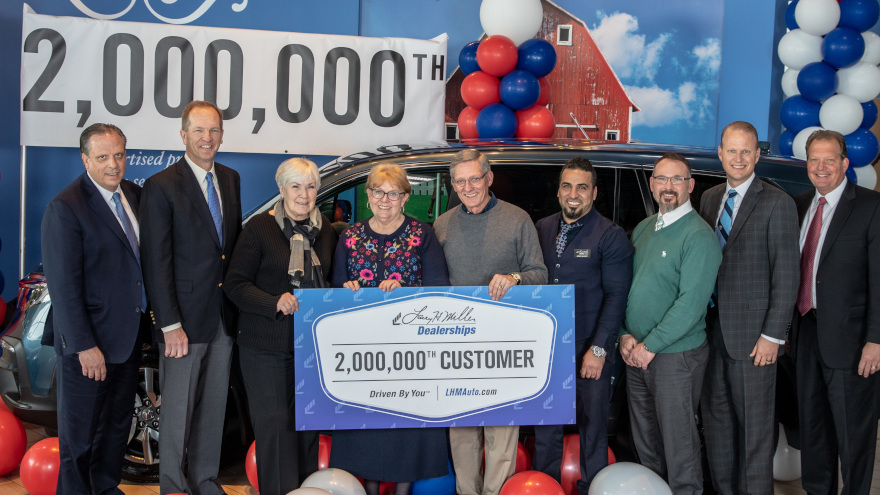Manheim has seen how consumer brands such as Amazon and Netflix have increased customer engagement by deploying personalized services. Now, Manheim is following that example to enhance its own offerings, like its mobile app and Simulcast service.
In other Manheim news, the company is now integrating with vAuto’s Provision to help dealers value consumer trade-ins and act more quickly to list vehicles in the wholesale marketplace.
For the first piece of news on Manheim’s personalization initiatives, the company says it is working to deliver experiences targeted toward each individual dealer using its digital properties.
Manheim says its moves toward more personalization come as dealers are demanding digital channels that allow dealers to confidently and efficiently buy and sell inventory. They will be able to find the vehicles most relevant to them, gain quick access to their most frequently used digital tools, and find more information about the vehicles they are looking to purchase.
The Manheim.com homepage, search experience, Simulcast, and Seller Dashboard are among the areas that the company says will see enhanced personalization in 2019.
In addition, Manheim says it is creating “a new mobile experience” for dealers. That personalized experience will provide dealers features such as recommended vehicles, relevant filters, improved keyword search and faster access to important information. Sellers will receive various services from the desktop via the mobile app.
A group of dealers will be part of a pilot program for the new Manheim.com in the second quarter. After that, all users will be able to try the new experience throughout the rest of 2019.
“The enhancements to both Manheim.com and the mobile app reflect Manheim’s continued investment in digital channels,” Zach Hallowell, vice president, Manheim Digital Marketplace, said in a news release. “With solutions geared exclusively for our clients, dealers will be able to navigate the digital wholesale marketplace with increased information, helping them make faster and more informed decisions.”
For the second recent piece of Manheim news, the company is describing its integration with vAuto’s Provision as the first integration between two Cox Automotive mobile apps. The integration combines two mobile technologies, vAuto’s Provision app and Manheim Express, and the company says that helps dealers list inventory for wholesale quickly. Not having to transport a vehicle to auction saves time and money, the company adds.
Manheim says the connection helps make wholesaling vehicles easier and more cost-effective. Dealers evaluate approximately 450,000 trade-ins each month with Provision. Of those, 50,000 end up in Manheim’s wholesale marketplace, according to the company.
“The integration helps dealers know how much they can get for a vehicle at wholesale, and begin the wholesale process, whether it’s during a trade-in appraisal or after a vehicle hasn’t sold at retail, with a single tap on a mobile device,” Randy Kobat, senior vice president of vAuto, HomeNet, and Dealertrack DMS for Cox Automotive, said in a news release.
When it is time for vAuto dealers to wholesale a vehicle, the Manheim Express integration gives them what the company is calling a Guaranteed First Bid — or an instant, real-money offer — on that vehicle. Guaranteed First Bid is driven by valuation data from the Manheim Marketplace Report, and it sets a minimum floor price for a dealer’s vehicle.
Dealers using Guaranteed First Bid can reduce their risk and make good decisions during their appraisal and wholesale processes, according to the company.
Manheim will purchase the vehicle at the Guaranteed First Bid price if the vehicle does not sell for the floor price, or higher, within two sale-days of being listed. Dealers can quickly move unwanted vehicles off their balance sheets, according to Manheim.
“Combining Manheim Express’ Guaranteed First Bid with vAuto’s Provision appraisal processes provides dealers greater confidence in the values they are placing on trade-in vehicles,” Derek Hansen, vice president of Offsite Solutions at Manheim, said in a news release. “And with the ability to instantly list a vehicle, this partnership shows the seamless experience Cox Automotive is creating for dealers in the new digital wholesale marketplace.”
Paragon Automotive, with its Paragon Honda/Acura dealership in New York, has worked to keep up with the latest technology. The business boasts that its Paragon Direct app helps customers purchase and service their vehicles from their mobile devices.
Efforts like that helped the company achieve what it says was a record-breaking 2018, and Honda has awarded Paragon with its 2018 President's Award Elite. Paragon said in a news release that the award is only given to 10 dealers nationally out of more than 1,100 dealers. Paragon also received the Acura Precision Team Award.
Paragon said in a news release that both honors are the highest awarded by American Honda Motor Co. The company said the awards recognize dealerships that “achieve excellence throughout their sales and service operations while maintaining strong and thriving relationships with their clients.” The company says Paragon Acura and Paragon Honda are the top-selling Certified Pre-Owned dealers in the United States.
Technology has helped in those efforts. Paragon says it became the first dealer to build an app for the Google Assistant. With the Paragon Direct app, drivers use just their voices to schedule service such as routine maintenance, oil changes, and tire rotations. With the app, customers can request to have their vehicle picked up, serviced, and returned to their home within 24 hours, without visiting the dealership.
The company says customers who use the Paragon Direct app make twice as many repair orders compared to customers who don’t use the app.
Paragon customers want to live their lives, and they don’t have time to drop their car off at the dealership and wait for it to be serviced, Anthony Petito, Paragon’s service director, said in a news release. “Technology has changed their expectations, and we knew we needed to change our approach to service and marketing in order to meet those.”
When customers Don and Janine Edwards purchased a 2019 Honda Pilot from Larry H. Miller Dealerships’ Murray, Utah location on Jan. 28, they might not have known they were at the center of a company milestone.
The Pilot was the 2 millionth vehicle sold for Larry H. Miller Dealerships.
The company has come a long way since 1979, when Larry H. Miller began his career with a single automotive dealership in Murray. Since then, the company has grown to 63 dealership locations in seven Western states, selling 20 different automotive brands, with more than 5,000 employees.
The company sold its 1 millionth car in 2007. After purchasing the 2 millionth vehicle, Don and Janine Edwards received a $5,000 Visa gift card. Larry H. Miller Group of Companies owner and chairperson Gail Miller, Miller family members, and company management presented the award to the Edwards couple.
“In 1979, when we bought our first dealership, Larry and I could not have imagined selling 2 million cars, but today we are celebrating that milestone,” Gail Miller said in a news release. “We are grateful for the growth and success of our company and recognize the hard work and dedication of our employees and the continued support from our customers and the communities where we do business.”
Automotive and manufacturing recruitment firm Tier One Executive Search says its customers and the industry think of the company for its work in the manufacturing area. But the business notes that its recruiting work has also taken place in passenger car, recreation vehicle, off-highway equipment and heavy vehicle retail operations for many years.
Now, Tier One is expanding its dealership recruitment practice in the United States and Canada.
“Our focus in the next 12 months will be to grow our client base within the top 150 dealership groups in the passenger car segment,” Tier One senior partner Mark Thibodeau said in a news release.
In Asia, Europe and North America, Tier One Executive Search recruits in the manufacturing area of the automotive supply base, but it will continue to concentrate on its retail practice only in the United States and Canada. Aynk Murtty, director of business development for Tier One, said the company has worked to ensure that its retail practice grows to 30 percent of its overall revenues by 2020. Currently, the company’s dealership side comprises less than 15 percent of overall revenues.
The company stated that it has added two team members to the fulfillment side of the business to support this effort.
“We have always been process-driven, and our recruitment process is the same; robust process for both the retail and the manufacturing side of our business,” Murtty said in a news release. “The key thing is that we are able to consistently deliver talent that has a positive impact on our client companies.”
Tier One added that it focuses recruitment efforts for dealer groups at senior levels and for general managers, sales/leasing managers, and finance and service managers at the store level in the United States and Canada.
DealerPolicy, an auto insurance company geared toward car dealers, has been moving toward increasing its services. The company is already integrated with F&I software providers and also recently partnered with Equifax, which it says will help dealers accelerate the financing and purchase process.
Now, the company is expanding into the state of Virginia.
DealerPolicy notes that it is experiencing heavy growth and continues to add new dealers, and it plans to expand operations nationwide through 2020. The company says it provides car-buying customers the opportunity to purchase insurance by connecting them with licensed insurance agents while at the dealership or after they arrive home with their new car.
The company’s new platform provides consumers with their choice of insurance carriers and access to licensed insurance agents. DealerPolicy said its service increases car buyers’ purchasing power, giving them more funds to put toward buying their new car and F&I products. The company said it has helped automotive retailers generate more than $10 million in additional buying power for their customers.
DealerPolicy says its referral and payment programs provide dealers with a new source of recurring income. Dealers earn money each time a customer uses DealerPolicy’s technology to connect with a licensed insurance agent.
“Our excitement builds with each state we add to the DealerPolicy network,” Travis Fitzgerald, chief executive officer, said in a news release. “Virginia dealers and customers have urged us to bring the first all-inclusive insurance platform to their state, and we’re thrilled to fulfill their request.”
Building websites and consultation on inventory turn strategies are among several services that Dealer Car Search performs for auto dealers. Now, vehicle history tools from Carfax will help make managing and retailing inventory more transparent for Dealer Car Search customers.
Thousands of Dealer Car Search-powered dealer websites now feature the Carfax Vehicle History-Based Value and vehicle history filtering. That means online shoppers can see more upfront information about a vehicle's history and value, according to Carfax.
In addition, Carfax History-Based Value is now integrated into the Dealer Car Search inventory management feature.
Using the vehicle history-filtering, shoppers on dealer Dealer Car Search-powered websites can narrow their search results to include only vehicles with features such as Carfax 1-Owner, no reported accidents, or personal use vehicles.
Another new feature is that vehicles priced below the Carfax History-Based Value now have badges showing a “Great ” or “Good Value.”
With the enhanced inventory management feature, dealers now have access to more accurate pricing based on a vehicle’s history, according to Carfax. Dealers can use Carfax History-Based Value to price their vehicles more competitively, and dealers can see information to support their asking price before they list the vehicles online.
Transparency in today’s marketplace is crucial, Rick Wilson, chief executive officer of Dealer Car Search, noted in a news release, and he added that Carfax seeks transparency in all of its offerings. Joe Koenig, vice president of Carfax, added in a news release that people want to know that they are getting the right used car for the right price.
“More Carfax information built into the Dealer Car Search solutions helps alleviate these concerns and improves the online shopping experience,” Koenig said.
A new technology partnership expansion aims to help auto dealers increase revenue and improve operations in sales, service, and accounting, in part by delivering more actionable “spiffs” accountability that helps drive sales performance.
Automotive dealer management systems provider DealerBuilt is expanding its integration with channel partner Spiffit, a provider of Software-as-a-Service sales incentive management applications. The two companies have been partners for four years, and their previous integration was on the service side of the business. The new expansion is now for the sales and accounting side.
The companies say DealerBuilt DMS clients using the Spiffit platform will see improved efficiency in managing their various sales performance incentive funds.
The Spiffit program automates what the companies describe as burdensome manual incentive program record-keeping and reporting. They note in a news release that the program tracks the spiff incentive programs of dealership OEMs, vendors and dealer groups and displays liabilities, reconciles claims and compiles downloadable program data for what they describe as accurate reporting and fulfillment.
The platform is automated and DMS-driven, and the companies say it allows real-time sharing of sales, financial and performance metrics by employee and department. A feature called Spiffit Scoreboards engages the staff and members of the management team.
DealerBuilt says clients using Spiffit will see accurate and accessible digital documentation for all contests and pay plans. The companies say that will simplify incentives program administration, accounting, and payroll and add that it will help DealerBuilt clients eliminate end-of-month crunching of manual incentives reports. The companies add that those reports can be questionable, time-consuming and ineffective in the area of motivation.
“DealerBuilt provides hundreds of dealers with a DMS that empowers their staff to build processes best for them, encompassing a system centered around their customers, which makes Spiffit a perfect partner," Veronica Dunford, DealerBuilt executive vice president of business development, said in a news release, and she added that the partnership’s expansion to provide performance-enhancement will help DealerBuilt clients push back margin compression.
Sean Ugrin, Spiffit founder and chief executive officer, added that DealerBuilt clients using Spiffit will now see increased sales with improved incentive program management that engages staff and management.
David Adcock has joined dealership warranty, certification and maintenance program company Binary Automotive Solutions as executive vice president. In other personnel news, document management products company DealerDOCX appointed Bill Reidy as executive vice president.
Adcock brings more than 20 years of industry experience to his new position at Binary Automotive Solutions. He has worked with automotive dealerships as well as manufacturers, and he was previously a national sales trainer for Pat Ryan and Associates and Resource Automotive Group. He later served as regional development manager for AutoNation Texas and more recently was founder and president of dealer services agency Adcock Dealership Solutions outside of Dallas.
Adcock said in a news release that Binary Automotive Solutions had some “exciting client announcements and programs coming out in 2019.”
James E. Binkley, founder and CEO of Binary Automotive Solutions, said in a news release: “David has a proven track record as a dealer trainer and understands what it takes to help a dealership increase CSI and grow its profit.”
In another news release announcing the DealerDOCX’s appointment of Reidy, the company noted his more than 25 years of experience leading and developing automotive services industry teams and stated that Reidy’s role will be key in further strengthening DealerDOCX’s offerings.
Reidy has designed and implemented sales and account management processes for automobile dealer groups and automotive software providers. He led the national sales team as director of sales for vAuto and most recently served for four years as vice president of sales for automotive environmental health and safety services company, KPA.
John Smith, chairman and chief executive officer of DealerDOCX, said in a news release that Reidy’s “in-depth knowledge of what automobile dealers need will allow him to demonstrate to them the value of DealerDOCX’s complete end-to-end service.”
Coinciding with the National Automobile Dealers Association Foundation launching a vast program to promote the value of service technician jobs, Asbury Automotive Group announced the rollout of its new healthcare and stock ownership programs that are a part of the dealer group’s strategic plan to focus on frontline roles in fixed operations and sales in a competitive talent market.
NADA insisted the auto retail industry is facing a critical shortage of service technicians, which will only get worse in the coming years if not addressed. As a result, the association and one of the largest publicly traded dealer groups are responding.
“We believe that exceptional guest experience starts internally, so we need to reward the team members who serve our customers every day. Our frontline service and sales team members play a critical role serving customers in the ever-changing landscape of the automotive industry,” Asbury Automotive Group chief executive officer and president David Hult said.
“We remain committed to rewarding them with opportunities to own a stake in our business and save on healthcare costs,” Hult continued.
Starting this year, Asbury said it will pay the weekly employee healthcare premium for the base health plan option on behalf of eligible A and B level technicians, body shop technicians, painters and foremen. The company’s base health plan payment can be applied toward other health plans that the company offers.
Eligible sales advisers, service advisers and body shop estimators are also offered the same opportunity, according to a news release Asbury distributed this week.
“We’re excited to be able to offer this cost-savings for our team members,” said John Hartman, Asbury’s senior vice president of operations. “Asbury will pay the costs of the premium while allowing our frontline staff to have more money in their pockets each week. Over time, the savings can be significant, and we’re confident it will have a positive impact on our team members and their families.”
This year also marked the beginning of the performance year for Asbury’s new frontline equity program, called the Asbury Owners Club. A & B level technicians, sales and service advisers, body shop technicians, painters and estimators, with at least one year of tenure, are eligible to earn an equity grant if they reach individual performance targets.
The company indicated the awards are expected to be made in the form of restricted stock units and will vest on a three-year schedule.
“Industry-leading programs such as company-paid employee premiums for healthcare and frontline equity are some of the many factors that make Asbury and our 83 dealerships great places to work,” Hartman said.
“As a company, we are fortunate to be in a position to award the frontline team members who take care of our guests every day and have such an important role in the health of our business,” he went on to say.
The company mentioned the frontline equity program is expected to be a part of Asbury’s new equity plan, which is subject to shareholder approval during the second quarter of.
More details about NADA workforce campaign
Unveiled during NADA Show 2019, the National Automobile Dealers Association Foundation has announced the next phase of its Workforce Initiative, which includes the launch of a new consumer-facing website — www.nadafoundation.org.
The efforts are designed to promote the value of service technician jobs and provide the first and only centralized source of all OEM and industry training programs and scholarship opportunities for aspiring technicians.
The NADA Foundation has also announced an initial round of donations for its multi-faceted Workforce Initiative, including:
— $50,000 from the National Auto Auction Association
— $50,000 from PACCAR
— $25,000 from Porsche
NADA Foundation has donated an additional $250,000 to the effort.
Association officials reiterated the auto retail industry is facing a critical shortage of service technicians, which will only get worse in the coming years if not addressed.
NADA estimated America’s technical colleges and training programs graduate approximately 37,000 new service technicians annually. Yet, the association projected the industry needs to replace roughly 76,000 technicians every year just to keep pace with retirements and new jobs in the sector — leaving an annual shortage of 39,000 trained technicians.
To close this gap, officials highlighted the NADA Foundation’s Workforce Initiative aims to promote the benefits of these jobs and make it far easier for interested individuals to learn about the training opportunities that are available to them locally.
“Before today, there was no coordinated, industry-wide, brand-neutral effort to increase the number of trained technicians we’re integrating into our workforce. But thanks to the NADA Foundation Workforce Initiative and the launch of nadafoundation.org, there finally is,” 2019 NADA chairman Charlie Gilchrist said.
“Promoting the tremendous benefits of service technician jobs and making it easier for interested students to find out about the training and scholarship opportunities available to them where they live is vital to addressing the service technician shortage that every dealer is facing,” Gilchrist continued.
“We need an initiative the entire auto industry can get behind, so I’m extremely proud of this effort,” Gilchrist added. “Our workforce is our absolute best asset as dealers, but we have to recruit, train and retain the best people if we want to continue providing our customers with the best experience possible.”
NADA noted the average dealership technician in the United States today makes $61,067 in salary, plus benefits, and has great opportunities for personal growth and career advancement. The association pointed out experienced technicians at franchised dealerships can make more than $100,000 annually, and service managers can make even more.
In addition to the website and interactive map of training and training and scholarship opportunities, the Workforce Initiative includes:
— New video stories where real technicians talk about both their work and the lifestyle provided by their career
— An integrated digital marketing effort to increase enrollments in automotive tech training programs – especially at OEM-sponsored programs, which place thousands of students each year into dealership careers
— A robust presence at national train-the-trainer conferences and events, to promote the benefits of technician careers with high school guidance counselors, community colleges, military separation officers at bases, and at major conferences like SEMA
— Actionable economic research to determine how to best recruit and retain techs
— The possible creation of a nationwide network of career fair events to bring students, career centers and dealers together for employment in their communities
NADA stated one of the immediate the goals of the Workforce Initiative is to fill OEM training programs to capacity. The association acknowledged that many seats in those OEM training programs go unfilled each year even though full-time employment is virtually guaranteed upon graduation.
NAAA shared why it’s supporting NADA’s initiative.
“Our focus is on identifying ways to recruit and retain the best employees. We are encouraged by the NADA Foundation who has invested time and resources in an online platform that will give us the tools we need to be effective in connecting with the education and training institutions,” NAAA chief executive officer Frank Hackett said.
NADA president and CEO Peter Welch also described why the association is putting so many resources into this project.
“Until the launch of nadafoundation.org, there was nowhere for a prospective technician to find out where their closest training program was located. For example, Toyota’s T-10 website shows where the Toyota programs are, and GM’s ASEP website shows where the GM programs are. But each ignore the other, leaving prospective students confused,” Welch said.
“Our new website brings together all OEM training programs onto the same map, through data provided by our friends at Auto Service Excellence (ASE). Now anyone can now find out where the closest ASE training program is located, public or private, regardless of manufacturer,” Welch continued.
“The auto retail industry has a fantastic story to tell about the tremendous careers we provide,” Welch went on to say. “We just need to get together and start telling it to the right people.”
Portions of the U.S. are recovering from some of the coldest temperatures in decades and folklore groundhogs are providing mixed forecasts. However, Black Book editors already are seeing depreciation signals of spring being straight ahead.
Reinforced by the assessment of an auction general manager from the Southeast, editors noted in this week’s Market Insights report that early signs of spring arrived with a pair of truck segments showing no depreciation.
“We are starting to see a normalization in depreciation after higher drops at the start of the year. Both car and light truck segments are showing stability in values,” Black Book executive vice president of operations Anil Goyal said in the newest report.
Volume-weighted, Black Book reported overall car segment values decreased by 0.56 percent last week. In comparison, editors mentioned car values decreased by 0.65 percent on average during the prior four-week period.
“In car segments, the depreciation across segments was quite steady,” editors added.
Again volume-weighted, Black Book determined overall truck segment values — including pickups, SUVs and vans — softened by 0.42 percent last week. That’s below the average editors noticed during the previous four weeks when the decline came in at 0.58 percent.
Looking closer at the truck segment, editors noted the compact crossover/SUV segment depreciated the most, sliding by 0.68 percent or $78.
Turning next to the observations from Black Book’s representatives stationed at nearly 60 sales nationwide, here is what an auction GM in Tennessee told the lane watcher.
“Our sales percentages have been in the low 60s which is good. The market hasn’t hit full stride yet, but I expect it to take off in the next couple of weeks,” the auction GM said.
The other tales from the lanes offered an array of what’s happening in the lanes, including:
— From Massachusetts: “For the second week in a row the money was subpar. One of the few bright spots was the midsize SUVs.”
— From New Jersey: “For the most part luxury cars and SUVs were selling for lower, even the units with low miles and strong CRs.”
— From Indiana: “The sale was much better than the weather, with compact cars and CUVs leading the way.”
— From Florida: “The market is steady here, with dealers looking for vehicles that have both good miles and good history.”
Update on the specialty markets
As they do at the beginning of each month, Black Book editors also relayed their latest observations of what’s happening within the specialty markets. Here is that rudown:
— Collectibles: Black Book indicated the final sales numbers from the collectible car auctions held in Arizona are in, and they’re “impressive.” Editors computed the total for roughly 10 days of sales was a little more than $250 million.
— Recreational Vehicles: “We are solidly into winter now, and brutally cold weather has gripped large parts of the country,” editors said. “Although the volume of vehicles offered at auction has dropped, as we’d expect for this time of year, the values of those that were sold actually increased a little bit for both towables and motorized units.”
— Powersports: Black Book indicated powersports values are still “frozen” in negative territory this month. “The changes in value we see for February are very similar to the changes from January,” editors added.
— Heavy Duty: Editors noted used trucks of all ages dropped more across all segments than last month but are “still doing very well.”
— Medium Duty: Black Book mentioned increased demand has helped offset price depreciation as a steady supply of used inventory continues through January.












